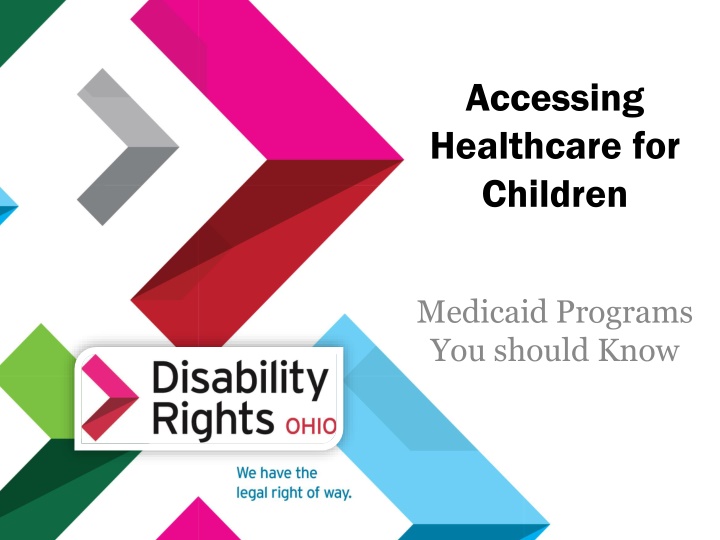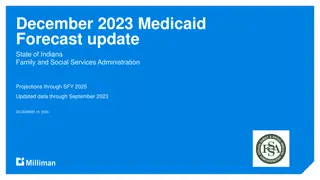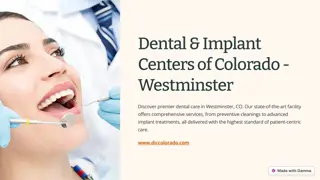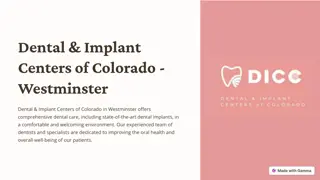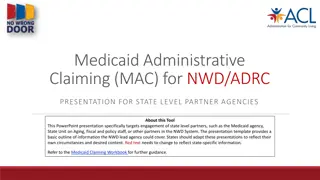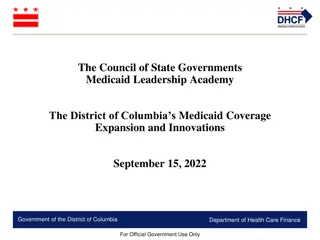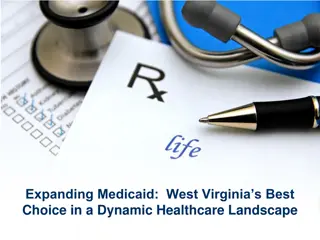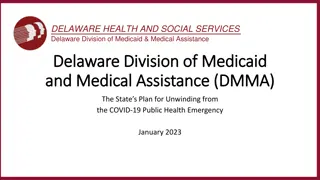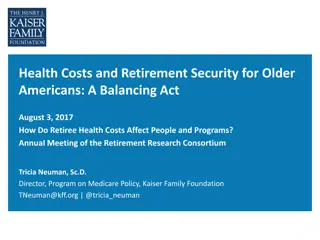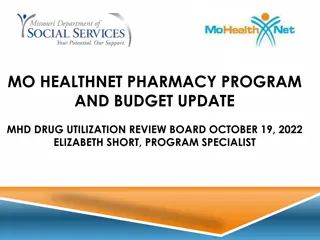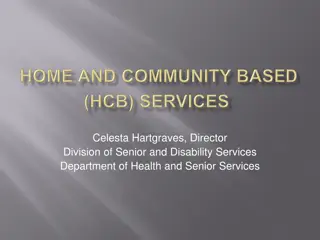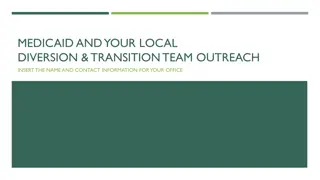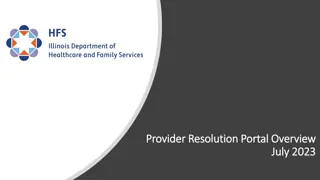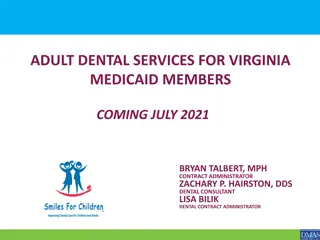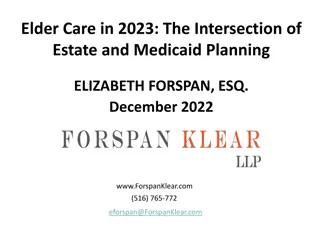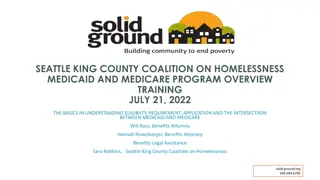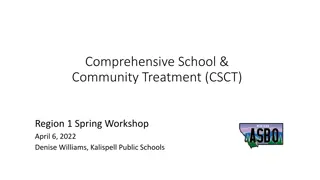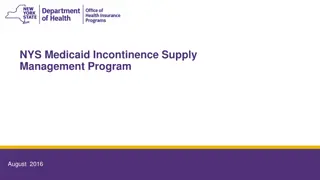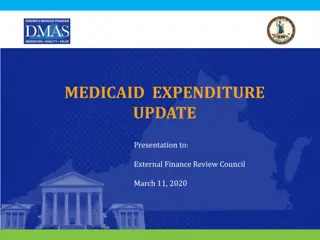Accessing Healthcare for Children: Important Information on Medicaid Programs
Learn about accessing healthcare for children through important Medicaid programs such as Early and Periodic Screening, Diagnostic and Treatment (EPSDT), Ohio's Medicaid in Schools Program, and Disability Rights Ohio's Medicaid Pro Bono Program. Disability Rights Ohio is a non-profit organization advocating for the rights of people with disabilities. Find out about eligibility criteria, contact information, and key services provided for children with disabilities. Discover the significance of EPSDT in providing preventive and treatment services for children up to age 21, including vision services and screenings to detect health conditions early.
Download Presentation

Please find below an Image/Link to download the presentation.
The content on the website is provided AS IS for your information and personal use only. It may not be sold, licensed, or shared on other websites without obtaining consent from the author.If you encounter any issues during the download, it is possible that the publisher has removed the file from their server.
You are allowed to download the files provided on this website for personal or commercial use, subject to the condition that they are used lawfully. All files are the property of their respective owners.
The content on the website is provided AS IS for your information and personal use only. It may not be sold, licensed, or shared on other websites without obtaining consent from the author.
E N D
Presentation Transcript
Accessing Healthcare for Children Medicaid Programs You should Know
Presenters Earnestine Hargett, Advocate ehargett@disabilityrightsohio.org Kristin Hildebrant, Senior Attorney khildebrant@disabilityrightsohio.org Alison McKay, Attorney amckay@disabilityrightsohio.org
Who We Are Disability Rights Ohio (DRO) is a non- profit corporation Ohio s designated Protection and Advocacy System and Client Assistance Program To advocate for the human, civil and legal rights of people with disabilities in Ohio
Eligibility for our Services People with disabilities No income requirement Clients are not charged for services Contact our intake department to request help
Contact Information Disability Rights Ohio 200 Civic Center Drive, Suite 300 Columbus, Ohio 43215 614-466-7264 800-282-9181 Disabilityrightsohio.org
Todays topics Accessing healthcare for children through: The Early and Periodic Screening, Diagnostic and Treatment (EPSDT)benefit Ohio s Medicaid in Schools Program (MSP) DRO s Medicaid Pro Bono Program
EPSDT Early and Periodic Screening, Diagnostic and Treatment. Federal Medicaid Program applicable to children up to age 21. Designed to find and treat health problems early so that children have better outcomes. Kids get access to additional services through EPSDT.
EPSDT Services Screening services "to detect physical and mental conditions periodically as a child grows, and whenever a problem is suspected. AAP Bright Futures established periodicity of screening (recommendations for preventive pediatric healthcare).
Vision Services At a minimum, diagnosis and treatment for defects in vision, including eyeglasses. Other vision services as medically necessary.
Dental Services At a minimum, dental services include relief of pain and infections, restoration of teeth, and maintenance of dental health. Other dental services as medically necessary.
Hearing Services At a minimum, hearing services include diagnosis and treatment for defects in hearing, including hearing aids. Other hearing services that are medically necessary.
Diagnostic Services When a screening indicates the need for further evaluation of a child s health, diagnostic services must be provided. Necessary referrals should be made without delay and there should be follow- up to ensure the child receives a complete diagnostic evaluation.
Treatment Services The treatment component of EPSDT is broadly defined. Any necessary health care, diagnostic services, treatment, and other measures (available through Medicaid) to correct or ameliorate defects and physical and mental illnesses and conditions discovered by the screening services.
Treatment Services Ohio must provide to children any additional health care services that are coverable under the Federal Medicaid program and found to be medically necessary, regardless of whether the service is covered in Ohio s Medicaid plan for adults.
Treatment Services Children are entitled to a broader range of services; Children are entitled to a greater amount, scope, and duration of services; As long as the services are medically necessary.
Healthchek: Ohios EPSDT program If a child is Medicaid eligible and can t access a specific service or more of a service through state plan services or a waiver, the child can access the service through EPSDT (if the service is medically necessary).
Healthchek: Ohios EPSDT program Ohio s EPSDT program is called Healthchek. Healthchek is administered by the county departments of job and family services.
How to get EPSDT services EPSDT treatment services are available to all Medicaid enrolled children regardless of how Medicaid eligibility was established (including kids on waivers). Treatment beyond state limits or for services not on the state plan is accessed through prior authorization.
How to get EPSDT services Any Medicaid provider can recommend services beyond state plan services and limits if the service is medically necessary under the EPSDT standard. Provider pursues prior authorization for service.
Medicaid School Program The Medicaid Schools Program is administered jointly by the Ohio Department of Education (ODE) and the Ohio Department of Medicaid (ODM) This provision allows reimbursement for valid and appropriately documented Medicaid services provided to students with disabilities under the IDEA
Medicaid School Program To allow schools to become Medicaid providers of skilled therapy and other specified services deliver to children who have and Individual Education Program Provider eligibility is tied to the IEP and is limited to the entity responsible for funding the IEP and providing the due process rights under IDEA This does not include students with disabilities served under Section 504
Medicaid School Program The eligible institutions are: City, Local and Exempted Village School Districts State Schools for the Deaf and Blind Community/ Charter Schools
Medicaid School Program Schools are responsible for providing only those medical services that are necessary to provide a free and appropriate public education (FAPE) to students with disabilities under the Individuals with Disabilities Education Act (IDEA). The frequency, amount, and duration of school based v community services may be significantly different on each of these continuum.
Medicaid School Program Covered services include but are not limited to: Speech therapy Occupational therapy Physical therapy Nursing Mental health services Aide services **
Medicaid School Program It also includes specialized transportation from school to/from medically necessary services, not from or to home Not directly billed, but reimbursed: Administrative Activities Medical Equipment and Supplies Equipment becomes the property of the district
Medicaid School Program A school district may ask a family to apply for Medicaid, but the agreement must be voluntary for the family. In the event that a family agrees to permit the school to use Medicaid or private insurance, this must not result in a cost to the parent, such as a co-payment or reduction in annual or lifetime cap on coverage. Refusal cannot be used to deny special education or related services
Medicaid School Program If a Medicaid enrolled child also has private insurance coverage, Medicaid would require the use of the private insurance, first. The IDEA regulations do not effect the requirement under Medicaid that the state Medicaid agency pursue third party payers such as private insurance.
Medicaid School Program If a student is covered by both private insurance and Medicaid, the IDEA requires, the public agency to obtain the parent s consent to use the private insurance, or not use Medicaid to provide the service.
Medicaid School Program The right of a student with a disability to a Free and Appropriate Public Education (FAPE) is not dependent upon whether the parents agree to the use of public insurance/Medicaid A school district may ask a family to apply for Medicaid or other public benefits, but it cannot be a requirement to receive services.
Medicaid School Program Parental permission is needed prior to disclosing information to the Medicaid agency or private insurers. The Family Rights and Privacy Act (FERPA requires signed and dated consent before schools or other education agencies disclose personally identifiable information from the student s educational records
Medicaid School Program IDEA requires participating education agencies to obtain a one-time written consent from the parent after receiving a written notice describing the scope of the consent including: Release of personally identifiable information Purpose of the disclosure Agency who will receive the information This requirement is now included on the IEP form
Medicaid School Program This one time consent will remain in place for a child with a disability until the student: Leaves special education via graduation, aging out, or voluntary withdrawal Leaves the school district in or out of Ohio Parent withdraws consent to permit the educational agency to continue to disclose information regarding the student.
Medicaid School Program If a parent consents to all the school district to use their child s community Medicaid benefits their access to the Medicaid community services under EPSDT should not be limited. Your child continues to be entitled to a free and appropriate public education and you should not experience any cost to you whether you agree to the use of your child Medicaid benefits at school or not
Medicaid Pro Bono Program
Pro Bono Program Disability Rights Ohio receives many calls from people across the state after their Medicaid insurance denies their requests for services or equipment and they find themselves entangled in the very complicated Medicaid appeals process For example: speech generating devices, wheelchairs, nursing or aide services, waivers
Pro Bono Program Partnerships with Nationwide Insurance and McDonald Hopkins, LLC connect people with volunteer attorneys and paralegals who provide free legal representation in certain Medicaid appeal cases
Covered Counties Ashland Ashtabula Champaign Clark Coshocton Cuyahoga Delaware Erie Fairfield Fayette Franklin Geauga Greene Hardin Hocking Huron Knox Lake Licking Logan Lorain Madison Mahoning Marion Medina Morrow Muskingum Perry Pickaway Portage Ross Stark Summit Trumbull Union Wayne
Potential Issues Denial of eligibility for a specific program, including: Medicaid waivers (such as Ohio Home Care, Individual Options) The waiting list for Medicaid waivers and/or waiting list assessment determinations The Medicaid Buy-In for Workers with Disabilities program Denial of or reduction in services, such as: Assistive Technology or Durable Medical Equipment Home modifications Nursing or aide services Therapy services (such as Applied Behavior Analysis (ABA), occupational, physical, and speech/language services) Medicaid waiver services
Pro Bono Program Eligibility for the program does not mean a volunteer will be able to represent, as DRO cannot guarantee that a volunteer will be available and able to take a case More information available on our website at www.disabilityrightsohio.org/medicaid
